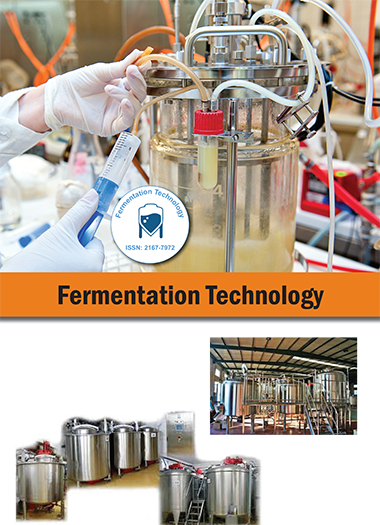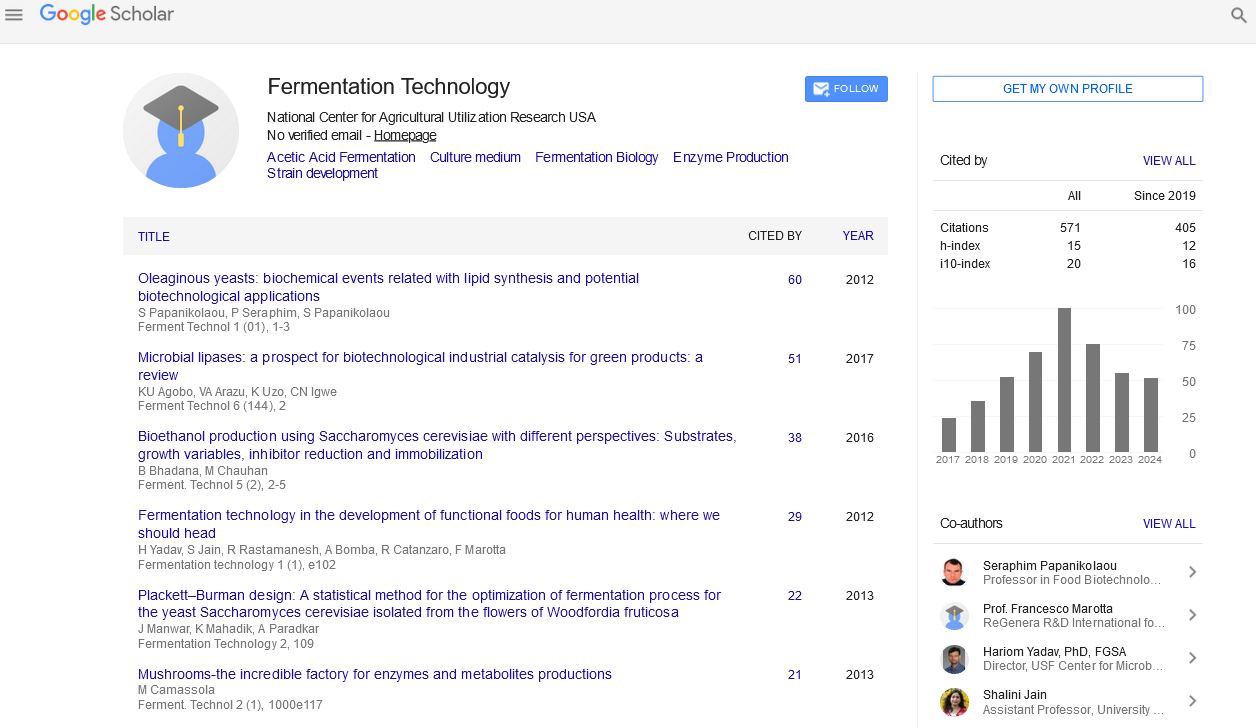Indexed In
- Open J Gate
- Genamics JournalSeek
- Access to Global Online Research in Agriculture (AGORA)
- RefSeek
- Hamdard University
- EBSCO A-Z
- OCLC- WorldCat
- Publons
Useful Links
Share This Page
Journal Flyer

Open Access Journals
- Agri and Aquaculture
- Biochemistry
- Bioinformatics & Systems Biology
- Business & Management
- Chemistry
- Clinical Sciences
- Engineering
- Food & Nutrition
- General Science
- Genetics & Molecular Biology
- Immunology & Microbiology
- Medical Sciences
- Neuroscience & Psychology
- Nursing & Health Care
- Pharmaceutical Sciences
Short Communication - (2024) Volume 13, Issue 1
Fermentation Technology: Leading Sustainable Solutions for the Future
Diego Ramona*Received: 26-Feb-2024, Manuscript No. FMT-24-25554; Editor assigned: 28-Feb-2024, Pre QC No. FMT-24-25554 (PQ); Reviewed: 13-Mar-2024, QC No. FMT-24-25554; Revised: 20-Mar-2024, Manuscript No. FMT-24-25554 (R); Published: 27-Mar-2024, DOI: 10.4172/2167-7972.24.13.170
Introduction
Fermentation, the ancient process of converting sugars into alcohol or acids using microorganisms, has been an essential part of human civilization for years [1]. From the production of alcoholic beverages to the creation of essential food items like bread, cheese, and yogurt, fermentation has been fundamental to traditions and industries worldwide. However, recent advancements in science and technology have determined fermentation has reached new limits, transforming various sectors such as food and beverage, pharmaceuticals, energy, and environmental sustainability. In this article, we will explore some of the innovative developments in fermentation technology and their significance for the future.
Description
Microbial engineering and synthetic biology
In general, fermentation depends on naturally occurring microorganisms like yeast and bacteria to carry out the required biochemical transformations [2]. However, with the development of microbial engineering and synthetic biology, scientists can now design and modify microorganisms to improve fermentation processes for specific applications. This approach allows for the creation of novel strains with improved metabolic pathways, increased productivity, and improved resistance to environmental conditions. For example, engineered yeast strains are being developed for more efficient bioethanol production from renewable sources like corn, sugarcane, and lignocellulosic biomass. Similarly, engineered bacteria are being utilized to produce valuable chemicals, pharmaceuticals, and biofuels with higher yields and purity [3,4].
Fermentation in the food and beverage industry
In the food and beverage industry, fermentation continues to be a fundamental of production processes, contributing to the flavor, texture, and nutritional quality of various products. However, advancements in fermentation technology are useful manufacturers to expand their product offerings and meet advancing consumer demands. For example, the rising popularity of plant-based alternatives has produced innovation in fermentation-derived proteins, such as mycoprotein (from fungi) and pea protein, which serve as sustainable alternatives to animal-derived proteins like meat and dairy [5]. Furthermore, fermentation techniques are being used to develop functional ingredients with health benefits, such as probiotics, prebiotics, and enzymes, which promote gut health and digestion [6].
Fermentation in pharmaceuticals and biotechnology
In the pharmaceutical and biotechnology sectors, fermentation plays a vital role in the production of therapeutic proteins, antibiotics, vaccines, and other biologics [7]. Recent advancements in fermentation technology have caused to increased scalability, efficiency, and cost-effectiveness in the manufacturing of these biopharmaceuticals [8]. For example, the use of recombinant DNA technology allows for the expression of complex proteins in microbial hosts like Escherichia coli and yeast, enabling large-scale production with high purity and potency. Moreover, continuous fermentation systems and in-line monitoring technologies are being implemented to improve process control, reduce production times, and minimize resource consumption, thereby enhancing the sustainability of biopharmaceutical manufacturing.
Fermentation for sustainable energy and environmental
Beyond regular applications, fermentation is being controlled for sustainable energy production and environmental restoration [9]. Bioenergy technologies such as anaerobic digestion and microbial fuel cells utilize fermentation processes to convert organic wastes into renewable energy sources like biogas and electricity. These technologies not only reduce greenhouse gas emissions and reduce dependence on fossil fuels but also provide a way to utilize waste and recover resources. Furthermore, microbial fermentation is being explored for environmental restoration purposes, such as the bio-restoration of contaminated soil and water through the degradation of pollutants by specialized microbial consortia [10].
Future directions and challenges
While the advancements in fermentation technology hold great potential for various industries, several challenges must be addressed to realize their full potential. One such challenge is the optimization of fermentation processes for scalability, reproducibility, and cost-effectiveness, particularly in the context of large-scale industrial production. Additionally, the development of strong regulatory frameworks and safety standards is essential to ensure the quality, purity, and safety of fermented products for human consumption and other applications. Moreover, ongoing research is needed to explore new limits in microbial engineering, metabolic engineering, and fermentation biotechnology, presenting novel opportunities for innovation and sustainability.
Conclusion
In conclusion, advancements in fermentation technology are driving innovation and transformation across various sectors, from food and beverage to pharmaceuticals, energy, and environmental sustainability. By controlling the power of microbial fermentation, scientists and engineers are revolutionizing industrial processes, creating sustainable alternatives, and addressing global challenges such as climate change and resource decrement. As we continue to explore the potential of fermentation, collaboration between academia, industry, and government will be essential to accelerate progress, overcome challenges, and realize the potential of this ancient yet continuously developing biotechnological process.
References
- Torres-Guardado R, Esteve-Zarzoso B, Reguant C, Bordons A. Microbial interactions in alcoholic beverages. Int Microbiol. 2022;25(1):1-5.
[Crossref] [Google Scholar] [PubMed]
- Giuffrè D, Giuffrè AM. Fermentation technology and functional foods. Front Biosci (Elite Ed). 2024;16(1):8.
[Crossref] [Google Scholar] [PubMed]
- Hammer SK, Avalos JL. Harnessing yeast organelles for metabolic engineering. Nat Chem Biol. 2017;13(8):823-32.
[Crossref] [Google Scholar] [PubMed]
- Rahmat E, Kang Y. Yeast metabolic engineering for the production of pharmaceutically important secondary metabolites. Appl Microbiol Biotechnol. 2020;104(11):4659-74.
[Crossref] [Google Scholar] [PubMed]
- Elhalis H, See XY, Osen R, Chin XH, Chow Y. The potentials and challenges of using fermentation to improve the sensory quality of plant-based meat analogs. Front Microbiol. 2023;14:1267227.
[Crossref] [Google Scholar] [PubMed]
- Yadav MK, Kumari I, Singh B, Sharma KK, Tiwari SK. Probiotics, prebiotics and synbiotics: Safe options for next-generation therapeutics. Appl Microbiol Biotechnol. 2022;106(2):505-21.
[Crossref] [Google Scholar] (All versions) [PubMed]
- Martínez JL, Liu L, Petranovic D, Nielsen J. Pharmaceutical protein production by yeast: Towards production of human blood proteins by microbial fermentation. Curr Opin Biotechnol. 2012;23(6):965-71.
[Crossref] [Google Scholar] [PubMed]
- Li Y, Wang J, Li L, Song W, Li M, Hua X, et al. Natural products of pentacyclic triterpenoids: From discovery to heterologous biosynthesis. Nat Prod Rep. 2023;40(8):1303-53.
[Crossref] [Google Scholar] [PubMed]
- Singh S, Negi T, Sagar NA, Kumar Y, Tarafdar A, Sirohi R, et al. Sustainable processes for treatment and management of seafood solid waste. Sci Total Environ. 2022;817:152951.
[Crossref] [Google Scholar] [PubMed]
- Il'in VK, Starkov LV, Kostrov SV, Belikodvorskaia GA, Chuvil'skaia NA, Mukhamedieva LN, et al. Investigation of the process of personal hygiene items biodegradation by cellulose-fermenting microorganisms. Aviakosm Ekolog Med. 2004;38(3):48-51.
[Google Scholar] [PubMed]
Citation: Ramona D (2024) Fermentation Technology: Leading Sustainable Solutions for the Future. Ferment Technol. 13:170.
Copyright: © 2024 Ramona D. This is an open-access article distributed under the terms of the Creative Commons Attribution License, which permits unrestricted use, distribution, and reproduction in any medium, provided the original author and source are credited.

